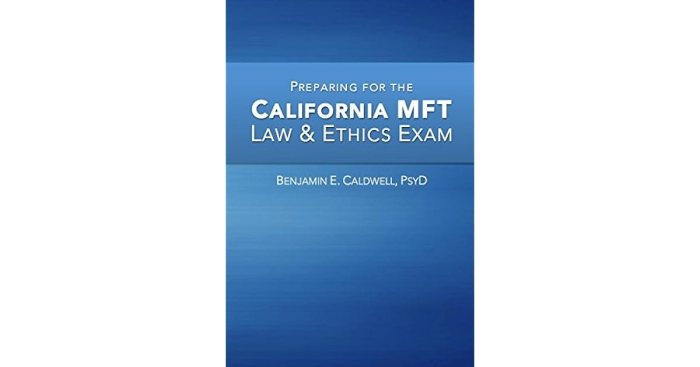Mft law and ethics exam practice test free – Prepare for the MFT Law and Ethics Exam with our comprehensive practice test, designed to guide you towards success. Our free resource provides valuable insights into the exam’s content, empowering you to navigate legal and ethical challenges with confidence.
Delve into the intricacies of MFT practice, exploring ethical principles, legal frameworks, and practical scenarios. Master the knowledge and skills necessary to uphold ethical standards and ensure legal compliance throughout your professional journey.
MFT Law and Ethics Exam Overview: Mft Law And Ethics Exam Practice Test Free

The MFT Law and Ethics Exam is a comprehensive assessment designed to evaluate the knowledge and understanding of marriage and family therapists (MFTs) regarding legal and ethical principles governing their practice. The exam is administered by the American Association for Marriage and Family Therapy (AAMFT) and is required for licensure as an MFT in many states.
The purpose of the exam is to ensure that MFTs have a solid foundation in the ethical and legal responsibilities associated with their profession, enabling them to provide competent and ethical services to clients.
Exam Content and Preparation

The MFT Law and Ethics Exam covers a wide range of content areas, including:
- Confidentiality and privacy
- Informed consent
- Dual relationships
- Boundary setting
- Ethical decision-making
- Legal frameworks and regulations
To prepare for the exam effectively, MFTs should familiarize themselves with these content areas through study guides, practice tests, and online courses.
Legal and Ethical Principles
MFTs are guided by a set of legal and ethical principles that govern their practice. These principles include:
- Confidentiality: MFTs must maintain the confidentiality of client information, except in limited circumstances where disclosure is legally required or necessary to protect the client or others from harm.
- Informed consent: MFTs must obtain informed consent from clients before providing services, ensuring that clients understand the nature and purpose of therapy, their rights, and the potential risks and benefits involved.
- Dual relationships: MFTs must avoid engaging in dual relationships with clients that could impair their objectivity or create a conflict of interest.
- Boundary setting: MFTs must establish and maintain appropriate professional boundaries with clients, including physical, emotional, and financial boundaries.
- Ethical decision-making: MFTs must engage in ethical decision-making by considering the ethical principles, legal frameworks, and potential consequences of their actions.
Legal Frameworks and Regulations
MFTs must comply with a variety of legal frameworks and regulations that impact their practice, including:
- Federal laws: MFTs must comply with federal laws such as the Health Insurance Portability and Accountability Act (HIPAA) and the Americans with Disabilities Act (ADA).
- State laws: MFTs must comply with state laws governing the practice of marriage and family therapy, including licensing requirements and ethical guidelines.
- Ethical codes: MFTs must adhere to ethical codes established by professional organizations such as the AAMFT, which provide guidance on ethical conduct and professional responsibilities.
Case Studies and Scenarios
Case studies and scenarios can be used to illustrate ethical and legal dilemmas that MFTs may encounter in their practice. By analyzing these scenarios, MFTs can develop their ethical decision-making skills and gain a deeper understanding of the application of ethical principles and legal frameworks.
Practice Tests and Sample Questions, Mft law and ethics exam practice test free
Practice tests and sample questions can help MFTs prepare for the exam by providing an opportunity to test their knowledge and identify areas where they may need additional study. Sample questions may include:
- What are the ethical considerations when working with clients who are minors?
- How should an MFT respond to a client who discloses information about illegal activity?
- What are the legal implications of dual relationships in MFT practice?
Additional Resources and Support
MFTs can access a variety of resources and support to assist them with legal and ethical issues, including:
- Professional organizations: Professional organizations such as the AAMFT provide ethical guidance, resources, and support to MFTs.
- Ethics committees: Ethics committees within professional organizations can provide guidance and support to MFTs facing ethical dilemmas.
- Legal consultation services: MFTs may seek legal consultation from attorneys who specialize in family law or mental health law.
FAQ Resource
What is the purpose of the MFT Law and Ethics Exam?
The MFT Law and Ethics Exam assesses your understanding of legal and ethical principles in Marriage and Family Therapy, ensuring your competence in upholding ethical standards and legal requirements.
What topics are covered in the exam?
The exam covers a wide range of topics, including confidentiality, informed consent, dual relationships, boundary setting, ethical decision-making, legal frameworks, and regulations.
How can I prepare for the exam?
Utilize our free practice test, study guides, and online resources to enhance your understanding of the exam content. Engage in discussions with peers and mentors, and seek guidance from professional organizations.
